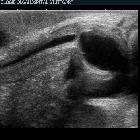berdon syndrome
Megacystis microcolon intestinal hypoperistalsis syndrome (MMIHS) (also known as the Berdon syndrome) is a rare congenital disorder characterized by a dilated non-obstructive urinary bladder and hypoperistalsis of the gastrointestinal tract.
Epidemiology
There is recognized strong female predilection.
Pathology
The disorder is thought to arise from defects primarily affecting the gastrointestinal and renal tracts . It is suggested that intestinal smooth muscle myopathy is responsible for the hypofunctioning intestine. Reduced actin level, degeneration of vacuoles and reduction in cytoskeleton protein have also been described.
Genetics
The disease carries an autosomal recessive inheritance with the gene locus at 15q24 although some authors suggest a sporadic occurrence in certain cases .
Associations
- polyhydramnios: can be present in ~25% of cases
- omphalocoele
- intestinal malrotation
Radiographic features
Antenatal ultrasound
Direct sonographic findings can include:
- fetal megacystis
- fetal megaureter
- fetal renal pelvic dilatation
- dilatated segments of bowel (including stomach): fetal bowel dilatation
Ancillary sonographic features include:
- presence of polyhydramnios
- presence of normal amniotic volumes in the context of the above renal tract findings
In the context of obstructive-like renal findings, the presence of normal to elevated amniotic fluid volumes may suggest the diagnosis.
Treatment and prognosis
The overall prognosis is considered to be poor and treatment has been shown to be generally ineffective . It is usually lethal within the first year of life .
History and etymology
First described by W E Berdon in 1976 .
Differential diagnosis
For antenatal hydronephrosis with hydroureter consider:
- prune belly syndrome: tends to be associated with oligohydramnios
- posterior urethral valves: also tends to be associated with oligohydramnios
Siehe auch:
- prune belly syndrome
- Urethralklappe
- incomplete intestinal rotation
- massively enlarged bladder in neonates
- Mikrokolon
und weiter:

 Assoziationen und Differentialdiagnosen zu megacystis microcolon intenstinal hypoperistalsis syndrome:
Assoziationen und Differentialdiagnosen zu megacystis microcolon intenstinal hypoperistalsis syndrome:

